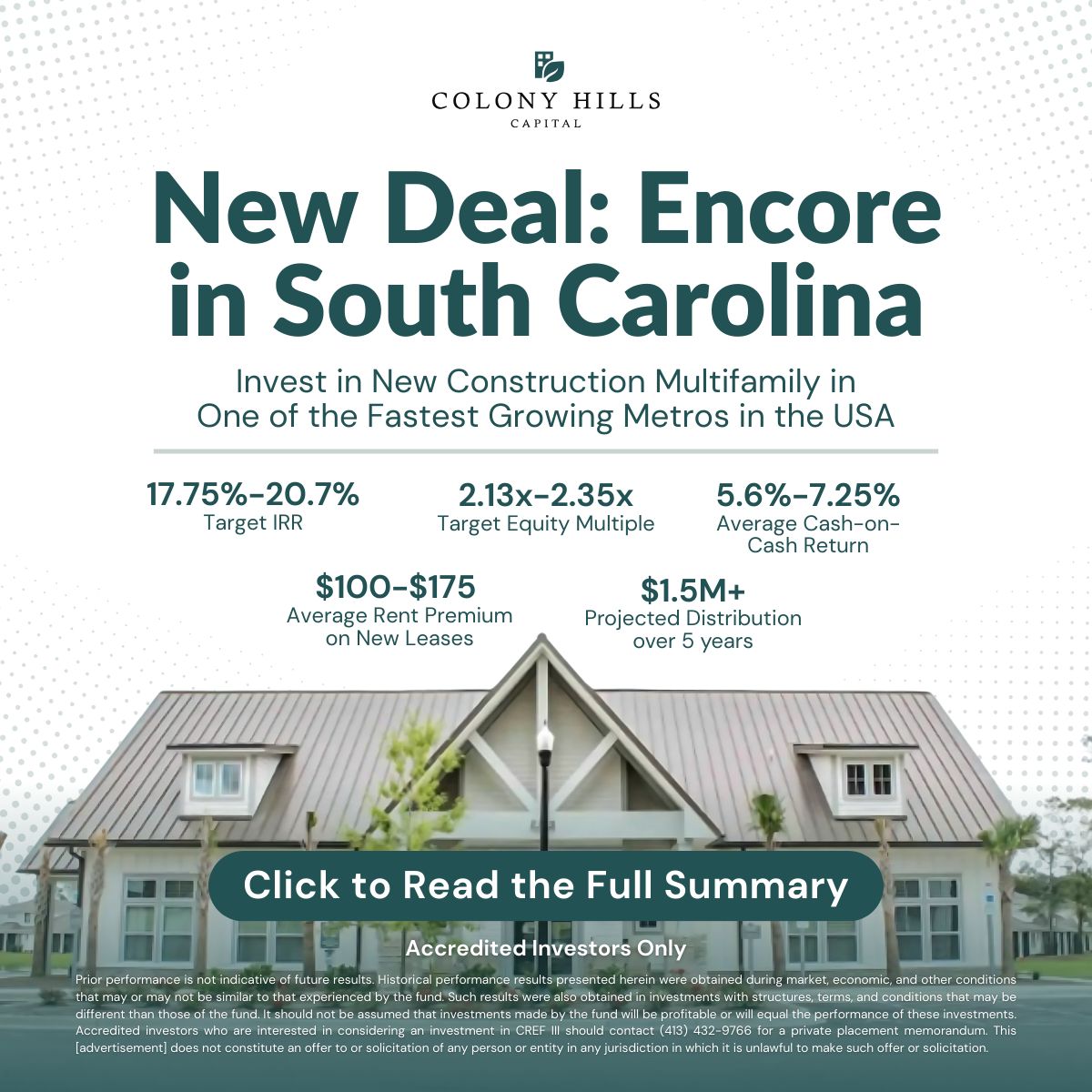- CRE Daily
- Posts
- The New Magic Number for NYC Developers is 99
The New Magic Number for NYC Developers is 99
NYC developers are shrinking projects to avoid costly wage rules under the new 485-x tax program.
Good morning. NYC developers are building smaller to dodge big wage bills. A new tax break tied to affordable housing is reshaping the city’s development strategy—just not how lawmakers planned.
Today’s issue is brought to you by Colony Hills Capital—invest as a GP alongside a $1B+ sponsor.
Market Snapshot
|
| ||||
|
|
Building Limits
The New Magic Number for NYC Developers is 99

Source: Angus Mordant/Bloomberg
A new state tax program is pushing developers to cap projects at 99 units, an unintended twist in New York’s fight to add housing.
The magic number: New York City developers are intentionally limiting projects to 99 units to sidestep wage rules tied to the state’s new tax incentive program, 485-x. The rule mandates that buildings with 100 or more units must pay construction workers at least $40 an hour—dramatically increasing project costs.
Zoom in: In the past year, developers filed 28 permits for 99-unit buildings—more than the total from the prior 16 years combined, according to the Real Estate Board of New York (REBNY). The shift reflects how developers are adjusting to the new economics of affordable housing construction under 485-x.

Case in point: Developer MaryAnne Gilmartin ditched plans for 400-unit towers in favor of smaller buildings, saying it’s the only financially viable path under new wage rules. Other developers agree, citing high interest rates, land costs, and tariffs that make large projects tough to pencil out. "We’ll build less housing, less quickly," Gilmartin said.
Policy meets paradox: The 485-x program was intended to restart development after 421-a expired in 2022, and it has—nearly 7,000 units were proposed in Q2, double the post-421-a pace. But critics say its wage mandates deter larger projects, undercutting efforts to scale housing in a city with soaring rents and a 500,000-unit goal by 2032.
The fine print: Building small has trade-offs. Each 99-unit project needs separate filings and timelines, while fixed costs like elevators dilute the economics. Midsize buildings may suit outer-borough neighborhoods better, but housing advocates warn that if larger projects don’t emerge, 485-x may need a reset.
➥ THE TAKEAWAY
A numbers game: By drawing a hard wage line at 100 units, 485-x may have created a sweet spot for developers, but a sour outcome for housing supply. Unless adjusted, the city could end up with more patchwork projects and fewer of the large-scale developments needed to make a dent in its affordability crisis.
TOGETHER WITH COLONY HILLS CAPITAL
Invest as a GP Alongside a $1B+ Sponsor
Colony Hills Capital has closed 37 deals since 2008, totaling $1.3B+ in transactions and delivering 20%+ levered IRRs across 13K+ garden-style units.
Their latest offering: Encore at Murrells Inlet — a Class A, newly built townhome community in coastal South Carolina with 92% occupancy, $100-$175+ lease premiums, no major capex, and an assumable 6.21% Fannie Mae loan.
Qualified investors can now invest as a GP in this stabilized, cash-flowing opportunity.
Target returns over a 5-year hold:
5.6%-7.25% cash yield
17.75%-20.7% IRR
2.13x-2.35x equity multiple
This deal delivers strong current income and long-term upside, without lease-up or renovation risk.
This is a paid advertisement. CRE Daily is not a registered broker-dealer or investment adviser. This content is provided for informational purposes only and does not constitute an offer or solicitation to buy or sell any securities. All investments carry risk, including potential loss of principal. Please conduct your own due diligence or consult with a licensed financial professional before making any investment decisions.
✍️ Editor’s Picks
IRS clarity: New guidance reshapes R&D deductions, allowing immediate expensing or amortization. Small businesses may retroactively benefit, marking a pivotal shift for innovation-focused taxpayers. (sponsored)
Distress play: Cottonwood Group has closed a $1B fund targeting distressed real estate, betting on high-rate-driven stress as a rare investment window.
Mid-cap momentum: CRE deal volume hit a 2025 high in July, fueled by a surge in mid-cap multifamily deals amid investor caution.
Buyer uncertainty: Vistry shares slid after a 12% drop in home sales and warnings of weak demand ahead.
Healthy hiring: Healthcare is driving nearly half of all private-sector job growth in 2025, with 18.2M employed and demand still rising.
Project pipeline: South Florida construction lending topped $3.2B since April as developers push forward despite tariffs and economic uncertainty.
Coalition building: Top NYC developers, including Related’s Jeff Blau, are urging Mayor Adams to exit the race and back Cuomo’s independent bid.
Cap rate watch: Cap rates may dip with a Fed cut, but deal volume, not rates, is the real mover.
🏘️ MULTIFAMILY
Concessions surge: Austin led the U.S. in rental concessions last month, as a flood of new supply pushed landlords to offer steep discounts.
Wave of listings: Multifamily sellers in Chicago are flooding the market with listings, betting that rising rents will offset expensive debt.
Loan optimization: Douglas Emmett secured $1.07B in refinancing for a 3,099-unit portfolio across Hawaii and California.
Ballot zoning: New Yorkers will vote this November on controversial proposals to shift who controls housing rezonings, potentially reshaping the city’s development process.
Sustainable design: Southern California landlords are replacing grass with drought-tolerant landscaping to claim record rebates ahead of 2027 water-use bans.
Height exception: R&M Properties is planning a 21-story senior housing tower in Redwood City, one of the tallest on the Peninsula.
🏭 Industrial
Port pressure: Shipping container prices have dropped over 60% since June, signaling a likely pullback in West Coast imports and softening demand for nearby logistics space.
Tech tensions: Goochland’s plan for a tech district and small nuclear reactor near homes is sparking public backlash over safety, property values, and transparency.
Philly squeeze: Demand for shallow-bay warehouses in Greater Philly is booming, but high land and construction costs are choking new supply.
🏬 RETAIL
Rocky expansion: PNC is acquiring FirstBank in a $4.1B deal, adding 95 branches across Colorado and Arizona and cementing its position as Denver’s top retail bank.
Request denied: Mesquite officials blocked Centurion American’s request for a 30-foot sign, frustrated by vacant retail space and unmet promises at its Iron Horse Village development.
Global arrival: Mixue, the world’s largest fast-food chain by location count, is entering the U.S. market with its first store in Tribeca.
Literary lifeline: Barnes & Noble is acquiring 174-year-old Books Inc. for $3.25M, preserving the historic Bay Area chain as it expands nationally.
🏢 OFFICE
Tech boost: The AI hiring surge is lifting office demand in tech hubs like San Francisco, New York, and Seattle—though experts say the long-term impact remains uncertain.
Demand mismatch: Austin’s office sublease glut lingers, with over 4.4M SF still on the market as major firms like Meta and State Farm offload space.
Foreclosure looms: Jamison Properties is facing foreclosure on its DTLA office tower after a pending sale fell through and efforts to pay off $35M in debt failed.
Steady fundamentals: Central Florida office demand remains cautious but steady, with no new supply, slight leasing gains, and long-term support from population and job growth.
Attendance policy: Microsoft is requiring most employees within 50 miles of an office to return in person three days a week starting February 2026.
🏨 HOSPITALITY
Worldwide expansion: UK-based Yotel has tapped former Marriott exec Phil Andreopoulos as CEO to lead its aggressive global expansion.
Loan package: Pacifica Hotels secured $126M in refinancing from Goldman Sachs and Peachtree Group to stabilize seven Southern California properties.
📈 CHART OF THE DAY

Source: S&P Global
U.S. apartment rents fell YoY in August for the first time since 2021, with all regions posting monthly declines, pointing to oversupply and softening demand across the board.

You currently have 0 referrals, only 1 away from receiving Multifamily Stress Test Model.
What did you think of today's newsletter? |



Reply